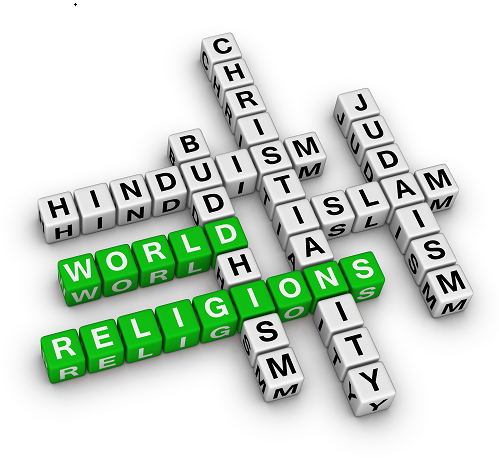Curriculum Intent – Religious Education
Religious Education challenges pupils to ask questions about the ultimate meaning and purpose of life: Why are we here? Does God exist? Is there a life after death? How was the universe created? It encourages pupils to respect themselves and understand their own identity. In RE pupils learn about different world religions and how they should be tolerant and respect others, whose faiths and beliefs may be different to their own. Religious Education is not about being ‘religious’, it is about helping pupils to live harmoniously with others in multicultural Britain. It promotes discussion and encourages pupils to think for themselves about ultimate questions and moral issues. The Intent is to revisit prior learning to broaden and deepen knowledge and to identify misconceptions and gaps in knowledge, developing age appropriate content through continued development of skills.
Intent:
It is our intent for the Religious Education element of our school curriculum to engage, inspire, challenge and encourage pupils, equipping them with the knowledge and skills to answer challenging questions. Religious Education contributes significantly to the Christian character of the school and enables pupils to ask deep and often searching questions about their own faiths and beliefs, and the beliefs, faiths and opinions of others regarding pertinent contemporary moral issues. Pupils will be able to deepen their understanding of God as encountered and taught by Christians, Muslims, Hindus and Sikhs. The teaching of RE makes links between the beliefs, practices and value systems of all faiths and world-views. The RE curriculum will help develop cultural capital and responsibility and respect for all aspects of diversity, whether it be social, cultural and religious, and prepare pupils well for life in modern Britain.
Year 7:
Students will start Year 7 with different starting points, due to the variety of religions and concepts taught within our feeder schools at KS2, and allocation time for RE. The Year 7 curriculum has been designed to continuously build on this through a sequenced Scheme of Work, addressing misconceptions, through a deepening understanding of religions and worldviews. The rationale for the ambitious, sequenced curriculum ensures that students can make connections and links both through verbal expression and developed written work, which complements learning.
The curriculum develops and builds on possible areas of study at KS2. Students start by bridging ‘the gaps’ (‘Introduction to RE’) moving on to develop a knowledge-rich curriculum establishing substantive and disciplinary knowledge. This is done through Independent Learning Booklets to complement in-class learning and a Summative Assessment to ascertain the starting point of each student.
The development of knowledge, understanding and skills deepens through the ambitious, sequenced curriculum at KS3. Topics are either taught through a systematic approach or and thematic approach, developing key terminology and skills. Links are continuously built throughout the teaching of all topics so that students are able to deepen and extend their knowledge and understanding and create the foundations for future learning. For example, ‘Science vs Religion’ links back ‘What is Stewardship?’ in terms of where the world came from and builds into ‘Does God exist?’ (Year 9). Consistent knowledge retrieval and the application beliefs, teachings and terminology complements a curriculum that becomes more difficult over time.

Year 8:
In year 8, students broaden their substantive and disciplinary knowledge through a systematic and thematic approach to RE. In addition, some students will have a foundation from KS2 that complements their learning further. For example, ‘What does it mean to be Hindu? revisits KS2 knowledge for those students who have studied Hinduism. Students apply beliefs and teachings they have studied to contemporary issues, developing skills that are consistently embedded in lessons. Key concepts and terminology are threaded through the topics that are taught. For example, ‘Where was God in all this?’ builds on the concept of injustice (Yr8), whilst introducing Judaism and a theological approach to the Holocaust, evil & suffering. ‘Religion, justice and equality’ links back to ‘The Life & Teachings of Jesus’, introducing new concepts, i.e., agape, forgiveness, and builds into ‘Should criminals be punished?’ (Year 9). Consistent knowledge retrieval and the application beliefs, teachings and terminology complements a curriculum that becomes more difficult over time.

Year 9:
Year 9 students make connections in-depth through a systematic and thematic approach to RE, that continuously builds knowledge and skills. For example, ‘What does it mean to be a Muslim?’ takes a systematic approach, revisiting KS2 knowledge for those students who have studied it. Continuing with an ambitious curriculum, students deepen and extend their ability to draw on knowledge, understanding and skills to make connections in-depth about religions and contemporary issues that have been studied. For example, connections can be drawn between ‘What does it mean to be Sikh?’, ‘What does it mean to Hindu?’ and ‘The Life and teachings of Jesus’. Key teachings and terminology are threaded through other topics from ‘The Life and Teachings of Jesus, ‘Religion, justice and equality,’ to complement ‘Should criminals be punished?’ and ‘Why is life important?’, thus extending the ability for students to create more in-depth evaluative and analytical responses. Consistent knowledge retrieval and the application beliefs, teachings and terminology complements a curriculum that becomes more difficult over time.

By the end of Key Stage 4 (Full Course GCSE: AQA Specification A):
Through a sequenced and ambitious curriculum, pupils will deepen and extend their knowledge and understanding of Christian and Islamic beliefs, teachings and practices and how these can differ. Students will be able to continuously build on prior substantive and disciplinary knowledge, making in-depth connections through a systematic and thematic approach to the course. Pupils will be able to identify places of religious significance around the world and the importance of those historically, and as places of pilgrimage, thus developing cultural capital. The sequencing of an ambitious curriculum for all, enables pupils to confidently articulate justified opinions on ethical issues, giving religious, non-religious and personal views. The threading of key beliefs concepts complements pupils’ learning ensuring that they have the skills to explain in detail how religious teachings in both Christianity and Islam can be applied to contemporary moral issues such as euthanasia, abortion, abuse of the world and the use of capital punishment. They will broaden their understanding through substantive and disciplinary knowledge how religious organisations support the global problems of injustice and poverty and link religious teachings to these issues. Through developed knowledge and skills, pupils will be able to confidently reflect on philosophical topics surrounding the existence of God and revelation to articulate justified opinions on such issues giving personal, religious and non-religious views.

Useful websites for revision and additional support are accessible on Teams

Useful websites for revision and additional support are accessible on Teams
KS4
AQA (8062 MA)
Christianity & Islam. Themes A, B, C and E)
2year Full Course
Paper 1 (1hr 45mins):
Christian Beliefs & Practices
Islam Beliefs & Practices
Paper 2 (1hr 45mins):
Theme A- Relationships and Families
Theme B- Religion and Life
Theme C- The existence of God and revelation
Theme E- Religion, crime and punishment
RE Provision for all (Key Stage 4 and 5):
In line with legal requirements, an ambitious Programme of Study has been created for Year 11 and Key Stage 5 students, delivered through timetabled form time. The intent is to follow the vision of Grace Academy, to develop well-educated citizens, with a set of values to become valuable and effective members of our local, national and worldwide community, building on aspects of RE and Citizenship. Students follow a programme based on Human Rights, making in-depth connections between RE and Citizenship, which they have studied, or are studying. The intent of this programme is to allow students to deepen and extend their knowledge and understanding of Human Rights that surround us today. Students work independently to develop social, moral, spiritual and cultural aspects of their education. Religious beliefs and teachings are threaded through their learning to broaden their understanding of how religious believers respond to issues that are in our contemporary world, such as human trafficking, prejudice and discrimination, religious freedom and caring for those who are living in poverty, developing their cultural capital. The ambitious Programme of Study continuously builds on prior learning so that students can express their personal views on such issues, whilst developing fluent written analysis and evaluative skills.
The Morality aspect of SMSC is deeply rooted within our ambitious, sequenced curriculum complementing the learning of KS3 students to study issues such as euthanasia, abortion and capital punishment. Students are able to develop arguments which are balanced in showing the rights and wrongs of each of the issues studied. This continues into KS4 with deeper thought through thematic studies. The Spiritual aspect of SMSC in our lessons, builds pupils’ skills giving them the opportunity to reflect on how the things they have learnt can affect and influence their own lives, and the lives of others. The threading of religious beliefs through the curriculum enables students to make connections to understand the impact they have on individuals and groups within our contemporary society. At KS3, the curriculum complements learning to deepen and extend knowledge and understanding, allowing students to reflect on their personal beliefs and the impact they have on them as individuals, thus developing their cultural capital. At KS4, students further develop the skill of justifying their own beliefs within assessments. Students are able to develop the Social aspect of SMSC, as we encourage students to share ideas and opinions, continuously building on prior learning to avoid misconceptions and make connections with their broadened understanding of religious beliefs and secular worldviews.
The Intent of the curriculum at all key stages aims to continuously develop the cultural capital of students to ensure that they become all-round citizens when leaving Grace Academy. We do this through a variety of learning experiences, and a broad curriculum, that allows students to reflect upon the multicultural society in which they live. For example, opportunities such as, Belief & Faith Forum (school twinning programme). Through an ambitious curriculum, and individual lessons that are delivered, students access media, articles, past and present philosophers/thinkers, past & present events, to broaden their understanding of their world to encourage them to be citizens who can make a difference. For example, breaking down misconceptions (Islamophobia, the Holocaust (prejudice and discrimination), stewardship (caring for the world in which we live), abortion, euthanasia, crime & punishment).

